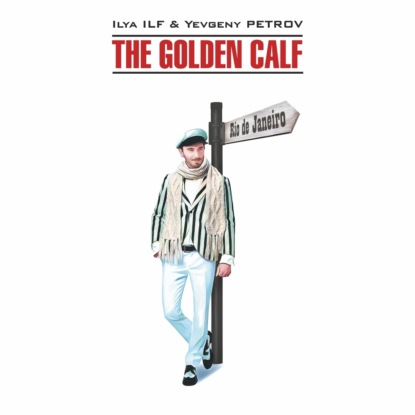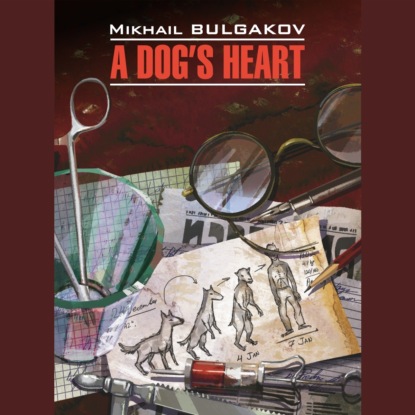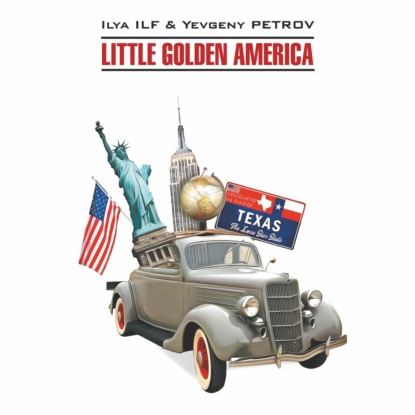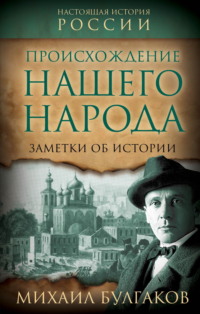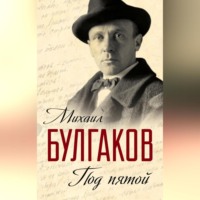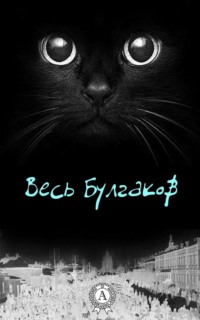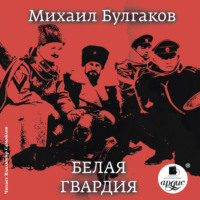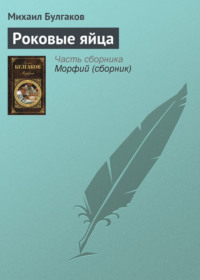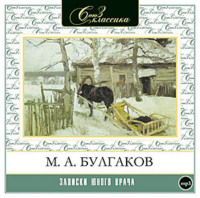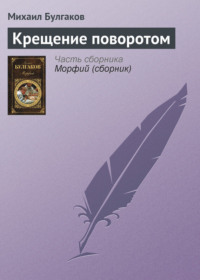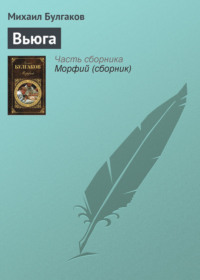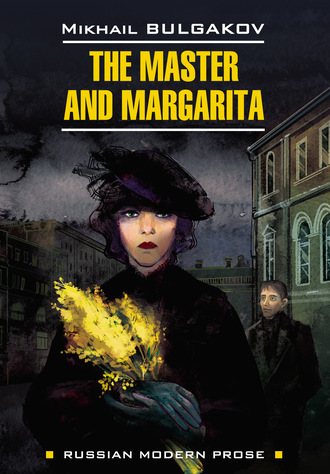
Полная версия
The Master and Margarita / Мастер и Маргарита. Книга для чтения на английском языке
“Grunya!”
But no one responded. At this point he glanced at the door of Berlioz’s study, which was next to the hall, and at this point he became, as they say, rooted to the spot. On the door handle he could make out the most enormous wax seal on a string.[207] “Hello!” somebody roared inside Styopa’s head. “That’s all I need!” And at this point Styopa’s thoughts started running along what was now a double track, but, as is always the way during a catastrophe, in just the one direction and, all in all, the devil knows where. It is difficult even to convey the muddle inside Styopa’s head. There was this devilish business with the black beret, the cold vodka and the incredible contract – and now, to add to all that, if you please, a seal on the door! That is to say, tell anyone you like that Berlioz had done something wrong, and he wouldn’t believe it – honest to God, he would not believe it! And yet the seal, there it is! Yes, sir. Yes indeed…
And at this point there began to stir in Styopa’s brain some most unpleasant little thoughts about an article which, as ill luck would have it, he had recently forced upon Mikhail Alexandrovich to be printed in his journal. An idiotic article too, between ourselves! Pointless, and the money wasn’t much.
Following immediately upon the recollection of the article, the recollection came flying in of some dubious conversation that had taken place, as he recalled, on the twenty-fourth of April, in the evening, right here, in the dining room, while Styopa had been having dinner with Mikhail Alexandrovich. That is to say, of course, in the full sense of the word this conversation could not have been called dubious (Styopa would not have entered into such a conversation), but it had been a conversation on some needless subject. They could perfectly freely not have embarked upon it[208] at all, Citizens. Before the seal, there is no doubt, that conversation could have been considered utterly trifling, but now, after the seal.
“Oh, Berlioz, Berlioz!” it came boiling up in Styopa’s head. “I just can’t believe it!”
But this was not the occasion to spend a long time grieving, and Styopa dialled the office number of the Variety’s Financial Director, Rimsky. Styopa’s position was a ticklish one: firstly, the foreigner might be offended by Styopa checking up on him after the contract had been shown, and talking to the Financial Director was extremely difficult too. After all, you really wouldn’t just ask him like this: “Tell me, did I draw up a contract with a Professor of Black Magic for thirty-five thousand roubles yesterday?” It wouldn’t do to ask like that!
“Yes!” Rimsky’s abrupt, unpleasant voice was heard in the receiver.
“Hello, Grigory Danilovich,” Styopa began quietly, “it’s Likhodeyev. Why I’m ringing is… hm. hm. I’ve got this. er… artiste Woland here with me. The thing is. I wanted to ask how things were with regard to this evening?”
“Ah, the black magician?” Rimsky responded in the receiver.
“The playbills will be here at any moment.”
“Aha,” said Styopa in a weak voice, “see you, then…”
“Will you be here soon?” asked Rimsky.
“In half an hour,” Styopa replied and, hanging up, squeezed his hot head in his hands. Oh, what a nasty business this was developing into! Whatever was the matter with his memory, Citizens? Eh?
However, it was awkward to linger in the hall any longer, and Styopa drew up a plan on the spot: use all possible means to conceal his unbelievable forgetfulness, and now, first and foremost, slyly enquire of the foreigner what he was actually intending to do in his show at the Variety, the theatre entrusted to Styopa.
At this point Styopa turned away from the telephone, and in the mirror located in the hall, which the lazy Grunya had not wiped for a long time, he distinctly saw a strange sort of character – lanky as a lath and wearing a pincenez (ah, if only Ivan Nikolayevich had been there! He would have recognized this character straight away!) But his reflection was there, and then immediately vanished. In alarm, Styopa looked a little deeper into the hall, and he was rocked for a second time, for there in the mirror the most strapping black cat passed by, then vanished too.
Styopa’s heart missed a beat; he reeled.
“What on earth is going on?” he thought. “I’m not losing my mind, am I? Where are these reflections coming from?” He looked into the hall and cried out in fright:
“Grunya! What’s this cat we’ve got wandering around[209]? Where’s it from? And someone else too?!”
“Don’t worry, Stepan Bogdanovich,” answered a voice, only not Grunya’s, but the guest’s from the bedroom. “The cat is mine. Don’t fret. And Grunya’s not here, I sent her off to Voronezh. She was complaining that you’d not given her any leave for a long time now.”
These words were so unexpected and absurd that Styopa decided he had misheard. In utter confusion he trotted to the bedroom and froze on the threshold. His hair stirred, and on his forehead there appeared a sprinkling of tiny drops of sweat.
The guest was no longer alone in the bedroom, but in company. In the second armchair sat that same fellow who had been seen dimly in the hall. Now he was clearly visible: a feathery moustache, one lens of the pince-nez gleaming and the other lens missing. But there proved to be even worse things in the bedroom: on the jeweller’s wife’s pouffe there lounged in a free-and-easy pose a third figure – namely, a black cat of awesome dimensions with a shot glass of vodka in one paw and a fork, on which he had managed to spear a pickled mushroom, in the other.
The light, weak in the bedroom as it was, began to fade completely in Styopa’s eyes. “So it turns out that this is how you go mad!” he thought, and grabbed hold of the doorpost.
“I see you’re a little surprised, dearest Stepan Bogdanovich?” enquired Woland of Styopa, whose teeth were chattering. “And yet there’s nothing to be surprised about. This is my retinue.”
At this point the cat drank the vodka, and Styopa’s hand slipped down the doorpost.
“And the retinue needs room,” continued Woland, “so there’s one too many of us here in the apartment. And it seems to me that the one too many… is specifically you!”
“Them, them!” the lanky one in checks began bleating like a goat, talking about Styopa in the plural. “Generally they’ve been acting like dreadful pigs of late. Drinking heavily, using their position to form liaisons with women, doing damn all – well, they can’t actually do anything, because they don’t understand a thing about what they’re charged to do. Pulling the wool over their superiors’ eyes[210]!”
“He misuses an official car!” the cat snitched on him, chewing a mushroom.
And at this point there was a fourth and final appearance in the apartment, while Styopa, who had by now slipped down completely onto the floor, was scratching at the doorpost with a weakened hand.
Straight from the mirror of the cheval glass there emerged a small but unusually broad-shouldered man with a bowler hat on his head and, sticking out of his mouth, a fang, which disfigured a physiognomy that was already of unprecedented loathsomeness. And with fiery red hair besides.
“I,” this newcomer entered into the conversation, “don’t understand at all how he came to be a director” – the red-headed man’s voice became more and more nasal – “he’s as much a director as I’m an archbishop!”
“You’re nothing like an archbishop, Azazello,” remarked the cat, putting some sausages on his plate.
“That’s what I’m saying,” said the red-headed man nasally and, turning to Woland, he added deferentially: “Will you allow us, Messire,[211][212] to damn well chuck him out of Moscow[213]?”
“Shoo!” the cat suddenly roared, with his fur standing on end.
And then the bedroom began spinning around Styopa, and he struck his head on the doorpost, and, as he lost consciousness, he thought: “I’m dying…”
But he did not die. Opening his eyes a little, he saw himself sitting on something made of stone. There was something making a noise all around him. When he opened his eyes up properly, he realized it was the sea making the noise and – even more than that – the waves were rising and falling right at his feet; in short, he was sitting at the very end of a mole; above him was the glittering blue sky and, behind, a white town in the mountains.
Not knowing how people behave in such situations, Styopa rose on shaky legs and set off down the mole towards the shore.
On the mole stood some man or other, smoking and spitting into the sea. He looked at Styopa wild-eyed, and stopped spitting.
Then Styopa came out with the following trick: he knelt down before the unknown smoker and uttered:
“Tell me, I beg you, what town is this?”
“Well, really!” said the heartless smoker.
“I’m not drunk,” replied Styopa hoarsely, “something’s happened to me. I’m ill. Where am I? What town is it?”
“Well, it’s Yalta.”
Styopa sighed quietly, toppled onto his side and struck his head on the warm stone of the mole. Consciousness left him.
8. The Duel between Professor and Poet
Just at the time when consciousness left Styopa in Yalta – that is, at about eleven thirty in the morning – it returned to Ivan Nikolayevich Bezdomny, who woke after a deep and prolonged sleep. It took him some time to grasp how it was he had ended up in an unknown room with white walls, with an astonishing bedside table made of some sort of bright metal and with a white blind, behind which he could sense the sun.
Ivan gave his head a shake, satisfied himself it did not ache, and remembered he was in a clinic. This thought pulled along with it the memory of Berlioz’s death, but today it did not elicit any great shock in Ivan. After a good night’s sleep, Ivan Nikolayevich had become a little calmer and begun thinking more clearly. Having lain motionless for some time in the cleanest of soft and comfortable sprung beds, Ivan saw a call button next to him. Out of a habit of touching objects needlessly, he pressed it. He expected some sort of ringing to follow the pressing of the button, or someone to arrive, but what happened was something else entirely.
At the foot of Ivan’s bed, a matt cylinder on which was written “Drink” lit up. After standing still for some time, the cylinder began to turn until the inscription “Nurse” appeared. It goes without saying that the ingenious cylinder amazed Ivan. The inscription “Nurse” was replaced by the inscription “Call doctor”.
“Hm,” said Ivan, not knowing what to do next with this cylinder. But at this point by chance he had some luck: Ivan pressed the button a second time on the words “Medical attendant”. The cylinder gave a quiet ring in response, it stopped, the light went out, and into the room came a plump, nice-looking woman in a clean white coat who said to Ivan:
“Good morning!”
Ivan did not reply, for he considered this greeting inappropriate in the circumstances. Indeed, they had confined a healthy man in a clinic, and were pretending, what’s more, that that was the way things ought to be!
But in the mean time, without losing her good-humoured expression, the woman, with the aid of a single touch of a button, had drawn up the blind, and sunlight poured into the room through a light and wide-meshed grille that reached right down to the floor. Beyond the grille was revealed a balcony; beyond that was the bank of a winding river, and on its other bank… a cheerful pine wood.
“Come and take a bath,” the woman invited him, and under her hands an inner wall opened up, behind which there proved to be a bathing area and a splendidly equipped lavatory.
Although he had decided not to talk to the woman, Ivan could not restrain himself and, seeing a broad stream of water gushing from a shining tap into a bath, he said with irony:
“Just look at that! Like in the Metropole!”
“Oh no,” replied the woman with pride, “much better. Such equipment isn’t to be found anywhere, not even abroad. Scientists and doctors come here specially to see our clinic. We have foreign tourists here every day.”
At the words “foreign tourists” the consultant of the previous day immediately came to Ivan’s mind. Ivan became gloomy, and looking out from under his brows he said:
“Foreign tourists. How you all adore foreign tourists! Yet you come across all sorts among them, you know. I met just such a one yesterday, for example, and it was really something to see!”
And he was on the point of telling[214] her about Pontius Pilate, but he contained himself, realizing these stories were nothing to this woman, and she could not help him anyway.
The washed Ivan Nikolayevich was straight away given absolutely everything a man requires after a bath: an ironed vest, long johns, socks. But that was not the end of it; opening the door of a little cupboard, the woman pointed inside it and asked:
“What would you like to put on – a dressing gown or pyjamas?”
Assigned to his new quarters by force, Ivan all but wrung his hands at the woman’s familiarity, and jabbed a finger in silence at the crimson flannelette pyjamas.
After this, Ivan Nikolayevich was led along an empty and soundless corridor and brought into a consulting room of the most enormous dimensions. Having decided to treat everything there was in this wonderfully equipped building with irony, there and then Ivan mentally christened the consulting room “the factory kitchen”.
And with good reason. Here stood cupboards and glass cabinets with shining nickel-plated instruments. There were chairs of extraordinarily complex construction, bulbous lamps with radiant shades, a multitude of phials and gas burners, and electric wires, and appliances that were completely unknown to anyone.
Three people set to work on Ivan in the consulting room – two women and one man, all wearing white. First and foremost they led Ivan away into a corner behind a table, with the clear aim of finding something out from him.
Ivan started thinking the situation over. Before him were three paths. The first was extremely tempting: to launch himself at these lamps and intricate bits and pieces and smash up the whole damned lot of them, and thus express his protest at being detained for no reason. But today’s Ivan already differed significantly from the Ivan of the day before, and the first path seemed to him dubious: who knows, they might be confirmed in the notion that he was a violent madman. The first path Ivan therefore renounced. There was a second: to begin at once the narrative about the consultant and Pontius Pilate. However, the experience of the previous day showed that this tale was not believed, or was somehow understood in a distorted way. Ivan therefore rejected that path too, deciding to choose the third: to retreat into proud silence.
He did not manage to realize this completely, being obliged to reply, like it or not – albeit both sparingly and gloomily – to a whole series of questions. And Ivan was asked about absolutely everything regarding his past life, right down to when and how he had been ill with scarlet fever some fifteen years before. When a whole page had been covered in writing down what Ivan had said, it was turned over, and a woman in white moved on to questions about Ivan’s relatives. A long-drawn-out sort of[215] procedure began: who had died, when and of what, did they drink, did they have venereal disease, and everything of that kind. In conclusion they asked him to tell them about the occurrence of the previous day at Patriarch’s Ponds, but they were very unexacting, and were not surprised by the information about Pontius Pilate.
At this point the woman gave Ivan up to the man, and the latter set about him in a different way, no longer asking questions about anything. He took Ivan’s body temperature, measured his pulse and looked into Ivan’s eyes while shining some sort of lamp into them. Then the second woman came to help the man, and they pricked something, but not painfully, into Ivan’s back, they drew signs of some sort on the skin of his chest with the handle of a hammer, they hit him on the knees with hammers, which made Ivan’s legs jerk, they pricked his finger and took blood from it, they pricked him in the bend of his elbow, they put rubber bracelets of some kind on his arms…
Ivan merely grinned bitterly to himself and reflected on how stupidly and strangely it had all turned out. Just think! He had wanted to warn everyone of the danger threatened by the unknown consultant, had meant to catch him, but all he had achieved was ending up in some mysterious consulting room for the purpose of recounting all sorts of rubbish about Uncle Fyodor in Vologda being a binge-drinker. Insufferably stupid!
Finally they let Ivan go. He was accompanied back to his room, where he was given a cup of coffee, two soft-boiled eggs and some white bread and butter.
Having eaten and drunk all he had been offered, Ivan decided to wait for someone of seniority in this establishment, and then to secure from this person of seniority both some attention for himself and justice.
And his wait for this person came to an end, very soon after his breakfast too. The door of Ivan’s room opened unexpectedly, and in came a host of people in white coats. Ahead of them all walked a man of about forty-five, carefully shaved like an actor, with pleasant but very piercing eyes and polite manners. His entire retinue was rendering him signs of attention and respect, and his entrance therefore had a very ceremonial effect. “Like Pontius Pilate!” it occurred to Ivan.
Yes, this was undoubtedly the senior man. He sat down on a stool, while everyone else remained standing.
“Dr Stravinsky,” the man who had sat down introduced himself to Ivan, and gave him an amicable look.
“Here, Alexander Nikolayevich,” said someone with a neat little beard in a low voice, and handed the senior man Ivan’s sheet of paper, completely covered in writing.
“They’ve cobbled together a whole case[216]!” thought Ivan. And the senior man ran his practised eyes over the sheet, muttered: “Aha, aha…” and exchanged a few phrases in a little-known language with his entourage.
'And he speaks in Latin, like Pilate.” thought Ivan sadly. Just then one word made him start, and it was the word “schizophrenia” – already uttered, alas, on the previous day by the accursed foreigner at Patriarch’s Ponds, and repeated here today by Professor Stravinsky.
“And he knew that too!” thought Ivan in alarm.
The senior man had evidently made it a rule to agree with everything and be pleased at everything his entourage might say to him, and to express this with the words “super, super.”
“Super!” said Stravinsky, returning the sheet to somebody, and he turned to Ivan: “You’re a poet?”
“I am,” Ivan replied gloomily, and for the first time suddenly felt an inexplicable kind of revulsion for poetry, and what came to mind straight away of his own verse seemed for some reason unpleasant.
Wrinkling up his face, he in his turn asked Stravinsky:
“Are you a professor?”
To this Stravinsky inclined his head with obliging courtesy.
“And are you the senior man here?” continued Ivan.
Stravinsky bowed to this too.
“I need to talk to you,” said Ivan Nikolayevich meaningfully.
“That’s what I’m here for,” Stravinsky responded.
“The thing is this,” began Ivan, sensing that his moment had come, “they’ve dressed me up as a madman and no one wants to listen to me!”
“Oh no, we’ll hear you out very attentively,” said Stravinsky seriously and reassuringly, “and on no account will we allow you to be dressed up as a madman.”
“Well, listen then: yesterday evening at Patriarch’s Ponds I met a mysterious person, possibly a foreigner, who knew in advance about Berlioz’s death and had personally seen Pontius Pilate.”
The retinue listened to the poet in silence and without stirring.
“Pilate? Pilate, that’s the one who was alive at the time of Jesus Christ?” asked Stravinsky, squinting at Ivan.
“The very same.”
“Aha,” said Stravinsky, “and this Berlioz died under a tram?”
“And he was the very one that was killed by a tram in front of me yesterday at Patriarch’s; what’s more, this same enigmatic citizen…”
“Pontius Pilate’s acquaintance?” asked Stravinsky, who was evidently notable for his great insight.
“Precisely,” Ivan confirmed, studying Stravinsky. “So he’d said in advance that Annushka had spilt the sunflower oil. And he did slip on exactly that spot! How do you like that?” enquired Ivan meaningfully, hoping to create a great effect with his words.
But that effect did not ensue, and Stravinsky very simply asked the next question:
“And who’s this Annushka, then?”
This question rather upset Ivan, and he pulled a face.
“Annushka is of no importance whatsoever,” he said fretfully, “the devil knows who she is. Simply some idiot from Sadovaya. The important thing is that he knew in advance – do you understand? – in advance, about the sunflower oil! Do you understand me?”
“I understand perfectly,” replied Stravinsky seriously and, touching the poet’s knee, he added: “Don’t get agitated, carry on.”
“I shall,” said Ivan, trying to hit the same note as Stravinsky, and already aware from bitter experience that calmness alone would help him. “And so this terrible character – and he’s lying about being a consultant – possesses some sort of extraordinary power. For example, you chase after[217] him, but there’s no chance of catching up with him. And there’s another pair with him, and they’re fine ones too, but in their own ways: some lanky man in broken glasses and, on top of that, a tomcat of unbelievable size that can ride on a tram all by itself. On top of that” – uninterrupted, Ivan spoke with ever greater ardour and conviction – “he personally was on Pontius Pilate’s balcony, there’s no doubt whatsoever of that. I mean, what on earth is going on? Eh? He needs to be arrested immediately, otherwise he’ll bring about indescribable calamities.”
“And so what you’re doing is trying to have him arrested? Have I understood you correctly?” asked Stravinsky.
“He’s clever,” thought Ivan, “you’ve got to admit that uncommonly clever people do turn up among intellectuals too. It can’t be denied,” and he replied:
“Quite correctly! And how could I fail to try, just think for yourself! And in the mean time they’ve detained me here by force; they poke a lamp in my eye, give me a bath, ask me lots of things about Uncle Fedya!.. And he’s long gone from the world! I demand to be released immediately!”
“Well then, super, super!” Stravinsky responded. “So everything’s been cleared up. Indeed, what point is there in detaining a healthy man in the clinic? Very well. I’ll discharge you from here straight away if you’ll tell me you’re sane. Not prove it, but just tell me. And so, are you sane?”
At this point complete silence fell, and the fat woman who had looked after Ivan in the morning gazed reverentially at the Professor, while Ivan thought once again: “Positively clever.”
He liked the Professor’s proposition very much, but before answering, he thought long and hard, wrinkling his brow, and finally said firmly:
“I am sane.”
“Well, that’s super then,” exclaimed Stravinsky in relief, “and if that’s the case, let’s do some logical reasoning. Let’s take the day you spent yesterday” – here he turned and was immediately handed Ivan’s sheet of paper. “In the search for the stranger who introduced himself to you as an acquaintance of Pontius Pilate you yesterday performed the following actions” – here Stravinsky began unfolding his long fingers, looking now at the paper, now at Ivan – “you hung an icon on your chest. Yes?”
“Yes,” Ivan agreed gloomily.
“You fell off a fence, injured your face. Right? Turned up at a restaurant with a lighted candle in your hand in nothing but your underwear, and in the restaurant you hit someone. You were brought here tied up. Finding yourself here, you telephoned the police and asked them to send machine guns. Then you made an attempt to throw yourself out of a window. Right? Is it possible, one asks, acting in this way, to catch or arrest anyone? And if you are a sane person, you will yourself reply: certainly not. You wish to leave here? Please do. But permit me to ask you: where you will head for?”
“A police station, of course,” replied Ivan, no longer so firmly, and becoming a little confused under the Professor’s gaze.
“Directly from here?”


